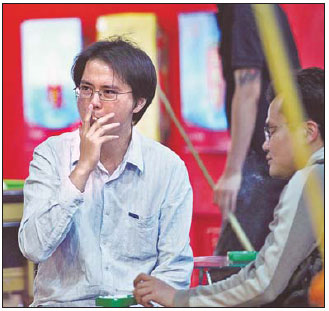Beijing hopes to stub out smoking
Beijing is working on making all public spaces - including work sites and transportation options - tobacco-free by the end of 2015, the Health Bureau revealed.
The bureau is also aiming to reduce the smoking rate among men in the capital from 4.6 to 4 percent during the next five years.
 |
|
A man smokes at a billiards bar despite a ban. [China Daily] |
Specifics from the plan have not yet been released.
And the results of a survey were also made public last week indicating that more than 95 percent of 2,100 interviewees in the capital knew that smoking might cause lung cancer.
The survey, which drew responses from people aged from 10 to 89, also showed that almost 60 percent of respondents knew that smoking could lead to apoplexy, a higher proportion than the 16 percent who knew nationwide.
More than half of people polled planned to give up smoking. The rate nationwide is just 27 percent.
The health bureau conducted a pilot project called Three Minutes Stop Smoking in some residential areas between March and June through which it trained doctors in offering tobacco-free advice to patients.
Zhang Junwei, a doctor at the Wangjing residential clinic, said doctors can play a crucial role in helping smokers give up.
He said the three-minute advice slots doctors gave during the recent pilot had a marked effect.
Zhang said one elderly smoker who had smoked about 20 cigarettes a day for 40 years gave up in five weeks.
"He was suffering from high blood pressure and other chronic disease," Zhang said.
"Smoking made his health conditions worse. With his doctor's medical guidance, he stopped smoking and felt better than ever."
He added that the elderly man subsequently brought some of his friends along to try to help them quit as well.
Wangjing residential clinic, which is viewed as a model center in the tobacco-free campaign, has given three-minute lectures to more than 5,000 smokers.
Today, nearly 80 percent of doctors in residential clinics are trained to offer tips to patients about quitting.
While the tobacco-free campaign has had some notable successes, it has also hit some problems.
The smoking rate has increased slightly since 2002.
"The number of people who will seek medical help to give up smoking is fewer than a quarter and fewer than a half of smokers have received anti-smoking advice from a doctor," said Du Hong, an official from the Health Bureau.
The survey found that 11.5 percent of teenagers aged under 18 smoked.
That figure was higher than the 9.11 percent who were said to be smokers in a report released by the Beijing Center for Disease Control and Prevention early in December.
According to Du, the Health Bureau sent 25,000 posters and more than 20,000 handbooks to hospitals, residential clinics and medicine stores this year promoting smoke-free existence.
 0
0 







Go to Forum >>0 Comments